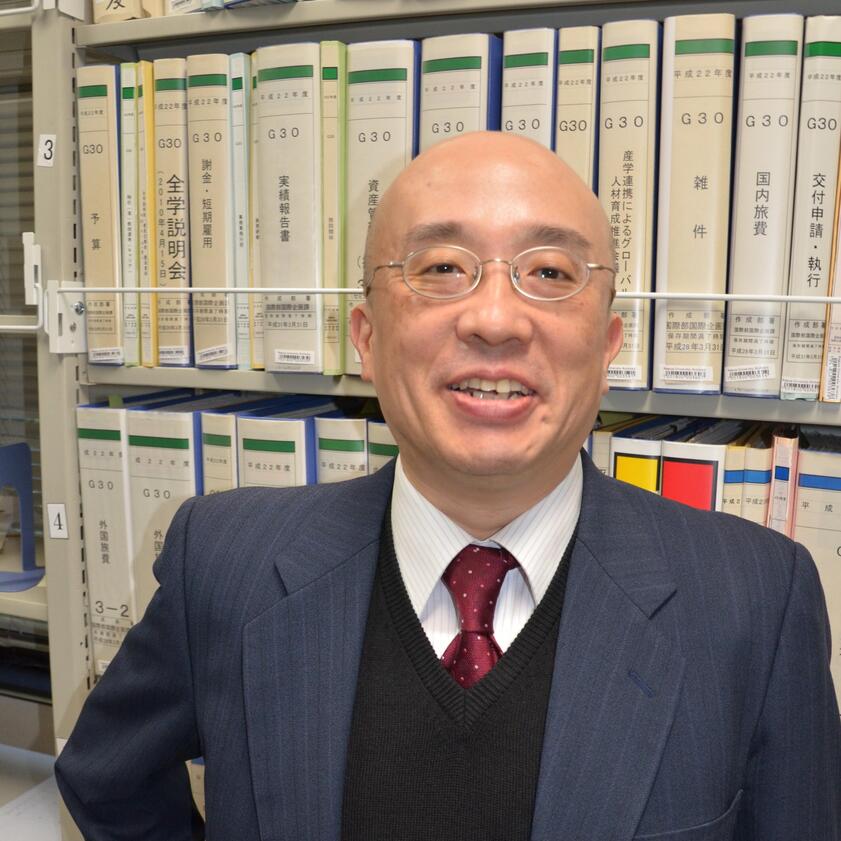Professor Ryuichiro Higashinaka

Researchers'
Designated Assistant Professor
Shinichiro Hotta
Nagoya University Archives
In the booklet "Presidents and the History of Nagoya University" (published by Nagoya University in 2014), edited by the Nagoya University Archives, we selected one phrase each from the words of past presidents during their terms in office. Among them, I was particularly impressed by these words of Sachio Hayakawa, the 9th president, at the graduation ceremony in March 1989.
Archival science and Japanese modern and contemporary history. As seen from the fact that the Japan Society for Archival Science was established in 2004, archival science is a new discipline. Although overlapping with traditional paleography in many respects, it also includes a new field that has until now been neglected in Japan. It considers how to reliably and efficiently archive for posterity the documents that record the activities of current organizations being created right now. As for modern and contemporary Japanese history, in addition to the history of Nagoya University, I also study the history of this region while working on the compilation of municipal histories such as the "History of Aichi Prefecture."
It is a bit abstract, but I hope to connect past, present, and future societies through historical materials. By properly preserving the remaining historical materials and using them to clarify the history of the past, and by properly preserving the records currently being created as archives, future generations will be able to scientifically examine the society of the present. I believe that only by creating a system in which this series of cycles is continuously repeated, society can ensure sound cultural inheritance.
I started to study archives in 2004 when I started working at the Nagoya University Archives. In the same year, the Japan Society for Archival Science was established, and archival science was beginning to attract attention in Japan. Furthermore, with the enactment of the Public Records and Archives Management Act in 2009 and the Act on the Protection of Specially Designated Secrets in 2013, as well as a series of recent disturbances, the issues of public records management and archives have become major issues in Japan. In this context, I work at the archives institution of a major Japanese university, and thus, have the opportunity to come into daily contact with staff members working on the frontline of the university's public records management. I have realized that I am in the perfect environment to examine the efforts of Nagoya University academically in light of archival science and to disseminate them widely inside and outside the university.
Letter from Motoji Shibusawa, the first President of Nagoya Imperial University, to Shoju Koyama, the then chairman of the House of Representatives, suggesting a part of local politicians' roles in the foundation of Nagoya Imperial University
(Deposited to the National Diet Library, Japan, on May 30, 1941)
Click on the image for a larger version.
When I discover new historical facts, especially those that provide clues to overturn prevailing theories or that touch on issues considered mysteries.
I do not think I have felt like I was on the verge of collapse and overcame it; rather, I think I have been trying, failing, and trying all these years. Put another way, I would say I try not to put myself in a situation in which I would become desperate.
I try to cover not just any topic related to the history of Nagoya University, but topics that can be explained in simple sentences using visuals such as photographs. It is not that we have a surplus of topics. New topics and historical materials from inside and outside the university are sometimes published in the following month's "Nagoya University Topics." If you have any information about the history of Nagoya University, no matter how trivial, please let us know.
It may be a little different from my goal, but I am interested in how the official documents and archives of the Tokai National Higher Education and Research System, currently under consideration for establishment, will be managed and operated, not only as a matter of business, but also from an academic perspective, since this is the first case of its kind in Japan.
Name: Shinichiro Hotta
Department: Nagoya University Archives
Title: Designated Assistant Professor
Career history and hobbies:
Born in Toyohashi City, Aichi Prefecture, Japan, Shinichiro Hotta graduated from the School of Letters, Nagoya University in 1993, and completed his doctorate in history at the Graduate School of Letters, Nagoya University in 2000. He became an research associate at the University Archives, Nagoya University in 2004, and has been a designated assistant professor there since 2013. He is the author of "A Short History of Nagoya University" at the end of "Nagoya University Topics." His hobby is playing Shogi (He is a big fan of Yoshiharu Habu, who is of the same generation).